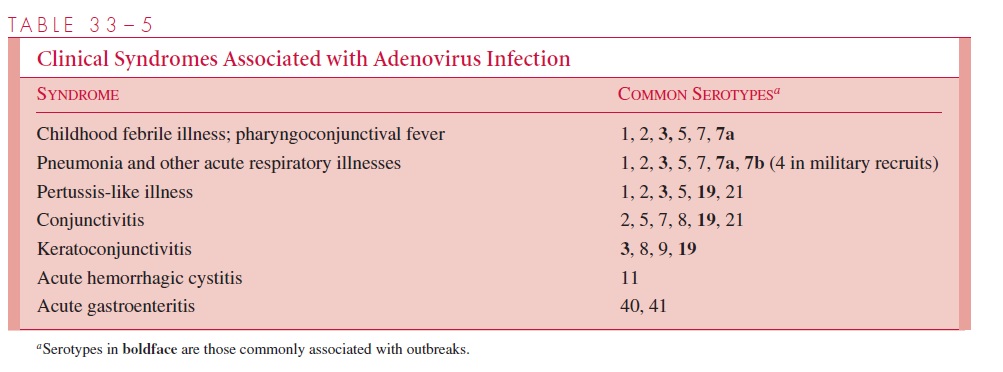Chapter: Medical Microbiology: An Introduction to Infectious Diseases: Influenza, Respiratory Syncytial Virus, Adenovirus, and Other Respiratory Viruses
Adenovirus Disease : Clinical Aspects
ADENOVIRUS DISEASE : CLINICAL ASPECTS
MANIFESTATIONS
The diversity of major syndromes and serotypes commonly associated with adenoviruses are summarized in Table 33–5. The acute respiratory syndromes vary in both clinical manifestations and severity. Symptoms include fever, rhinitis, pharyngitis, cough, and conjunctivitis. Adenoviruses are also common causes of nonstreptococcal exudative pharyngitis, particularly among children less than 3 years of age. Acute, and occasionally chronic, conjunctivitis and keratoconjunctivitis have been associated with several serotypes. More severe disease, such as laryngitis, croup, bronchiolitis, and pneumonia, may also occur. A syndrome of pharyngitis and conjunctivitis (pharyngoconjunctival fever) is classically associated with adenovirus infection. Adenoviruses can also cause acute hemorrhagic cystitis, in which hematuria and dysuria are prominent findings. Some serotypes are significant causes of gastroenteritis .

DIAGNOSIS
Many serotypes, other than those associated with acute gastroenteritis, can be readily iso-lated in heteroploid cell cultures. There is little difficulty in relating the virus detected to the illness in question when the isolate has been obtained from a site other than the upper respi-ratory or gastrointestinal tract (eg, lung biopsy, conjunctival swabs, urine). However, because of the known tendency for intermittent asymptomatic shedding into the oropharynx and feces, isolates from these latter sites must be interpreted more cautiously. Serologic test-ing of acute and convalescent sera may be necessary to confirm the relationship between the virus and the illness in question.
TREATMENT AND PREVENTION
There is no specific therapy for infection. A live virus vaccine containing serotypes 4 and 7, enclosed in enteric-coated capsules and administered orally, has been used in military recruits. The viruses are released into the small intestine, where they produce an asymptomatic, nontransmissible infection. This vaccine has been found effective but is neither available nor recommended for civilian groups.
Related Topics